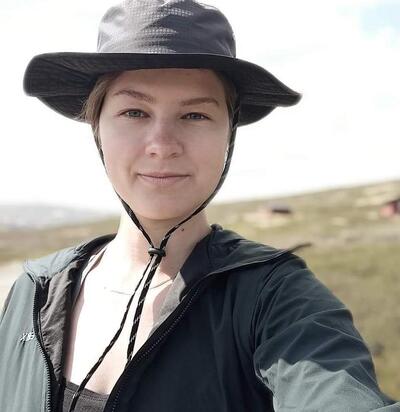Physical Geography, Master's, 2 years
- TuitionFor non eu/eea citizens
- Years2 Years
- Intake5
- Grade requirementsMinimum C
- LanguageEnglish
- ECTS120
- StartAutumn
Main content
What will you learn?
We offer a wide range of Master’s projects related to topics such as:
- Glaciers
- Natural hazards (floods, storminess, avalanches, etc.)
- Sea-level changes
- Hydrology and groundwater
- Periglacial processes and features
- Caves and landscape development
You will acquire relevant skills for your Master’s project through field, laboratory and theoretical courses in an inclusive and informal social environment at the Department of Geography.
Examples of methods, depending on the topic:
- Practical, field-based methods, such as sediment coring and geomorphological mapping.
- Survey techniques, such as echo sounding and unmanned aerial vehicles (UAVs).
- Laboratory techniques, such as sediment analysis.
- Computer-based analyses, such as GIS, LiDAR and remote sensing.
After completing your Master’s programme, you will know how to:
- Design a research project and collect relevant field data to reconstruct terrestrial climate and environmental changes.
- Interpret data and discuss potential causes of terrestrial climate- and environmental changes.
Full list of learning outcomes
More information below
Student life
Master’s students are an important part of the department’s social and work environment, and you will be integrated into the activities and courses of the larger group of geography Master’s students at the Department of Geography.
This study programme offers a variety of activities, such as labs, seminar groups, field trips, lectures and workshops, where you will get to work with fellow students and staff members.
You will conduct fieldwork as part of your Master’s degree, typically two to four weeks in August before your third semester.
When you start working on your Master’s thesis, you will be presented with different available Master’s projects related to ongoing research in physical geography in Norway. You will be assigned a supervisor and will have regular meetings with them throughout the Master’s programme.
Read more about previous Master’s projects
Career
Our graduates are qualified to work in various positions in the labour market, such as local and regional planning and management, GIS and cartographic consultancy, teaching and research.
As a geographer, you will:
- Build bridges between the natural and social sciences
- Possess both theoretical and practical skills
- Be experienced in conducting fieldwork
- Collaborate effectively in a team
- Demonstrate proficiency in report writing.
Graduates can also continue their education by pursuing a PhD.
More information below
Admission requirements and how to apply
To apply for the Master’s Programme in Physical Geography you need a Bachelor's degree of 3-4 years’ duration, or an equivalent educational background. The degree must include at least 1.5 years (80-90 ECTS) of full-time studies in geography, including 1 year (60 ECTS) in physical geography or related disciplines (e.g. quaternary geology, cartography, GIS, climatology, hydrology). A background focused on processes in landscapes influenced by glaciation (30 ECTS), or remote sensing applied in Physical Geography (30 ECTS), is a requirement.
The application must include a motivation letter (maximum one page) to clarify your background, and thematic and methodological interest in the Master’s project. Applicants with an interest in past climatic, geomorphological and environmental reconstructions (e.g. related to glaciers, hydrology, sea level, wind) from glacierised regions of the last Ice Age and present interglacial (the Holocene) will be prioritised.
You also need to document:
- Average grade of minimum C (equivalent to Norwegian grade C)
- Proficiency in English
How to apply
Follow these links to find the general entry requirements and guidelines on how to apply:
- Citizens from outside the European Union/EEA/EFTA (4 January 2024)
- Citizens from within the European Union/EEA/EFTA (1 March 2024)
- Nordic citizens and applicants residing in Norway (15 April 2024)
All applicants with citizenship from outside the EU/EEA must pay tuition fees.
Study structure
The program covers two academic years (four semesters) and starts in the autumn. You have two semesters to write your Master’s thesis (60 ECTS).
First semester
- GEO308 Theory of Science and Research Design for Geographers (10 ECTS)
- GEO310 Writing Course and Project Description (10 ECTS)
- GEO313 Field and Laboratory Methods in Physical Geography (10 ECTS)
- Milestone 1: Presentation of project description in December
Second semester
This semester, you can choose where to study, depending on the theme of the Master’s project. You can either follow courses at the Department of Geography, the Department of Earth Sciences or UNIS on Svalbard, or as an exchange student at one of our partner Erasmus universities.
- GEO316 Practical Skills in Remote Sensing and Spatial Analysis (10 ECTS)
- GEO317 Special Topics in Geography (10 ECTS)
- GEO341 Master Level Field Course in Physical Geography (10 ECTS)
- Milestone 2: Presentation of theory, research design and fieldwork plans in April/May
Third semester
- You carry out fieldwork and write your Master’s thesis (GEO350)
- Milestone 3: Poster presentation of data, main findings and methodology in October
Fourth semester
- You complete your Master’s thesis (GEO350, 60 ECTS)
Study period abroad
Most Master’s students in Physical Geography attend courses at UNIS, the University Centre at Svalbard in their second semester.
You can also spend the second semester as an Erasmus exchange student in Iceland, Wales, Germany or Poland.
The application deadline is 1 September (15 October for UNIS).
See list of recommended exchange agreements
Further studies
Graduates can also continue their education by pursuing a PhD.
Questions about the study?
Phone: +47 55 58 30 73
Mail: advice@geog.uib.no
